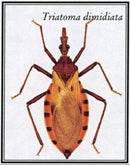Washington, DC, 12 June 2013 (PAHO/WHO) - During the 14th Meeting (13-14 November 2012) of the Intergovernmental Commission of the Initiative of Central American Countries for the Interruption of Vectoral and Transfusional Transmission and Medical Care of Chagas Disease (IPCA) Belize was certified with the Standard of Interruption of Vectoral Transmission of Trypanosoma cruzi (T. cruzi). This certification is the result of the implementation of the Resolution CD49.R19 "Elimination of neglected diseases and other poverty-related infections" that urge Member States to eliminate or reduce neglected diseases and other infections related to poverty for which tools exist, to levels so that these diseases are no longer considered public health problems by 2015.

In September 2005, Resolution 5 of the 21st RESSCAD hold in Belize, referring to Chagas' disease states: "To assume the commitment to achieve, within two years, the coverage of at least 50% of control of Triatoma dimidiata in the endemic areas and to implement universal serologic screening of T. cruzi in all public and private blood banks".
At the XII Meeting of the IPCA for the Interruption of the Vector-borne transmission, Transfusional transmission and Medical Care of Chagas' disease held in El Salvador in June 2010, Belize was congratulated for the progress report presented, which states low endemicity with probable absence of vector-borne transmission by T. cruzi. Considering this background and the results of the 2011-2012 sero-epidemiologic survey in school-age population it was confirmed the interruption of the vector-borne transmission of T.cruzi in the country. This survey included 1377 children from the six districts of the country, corresponding to 27 schools distributed in urban and rural areas, all with negative results.
Entomological and epidemiological information provided by Belize to the Chagas Subregional Initiative for Central America for 22 years, along with entomological and seroepidemiology data accumulated and the addition of the negative result of the serological school survey in 2011, supported the conclusion that the country has an interruption of vectorial transmission of T. cruzi. In addition, during at least the past 5 years there has been none acute cases of Chagas' disease.



